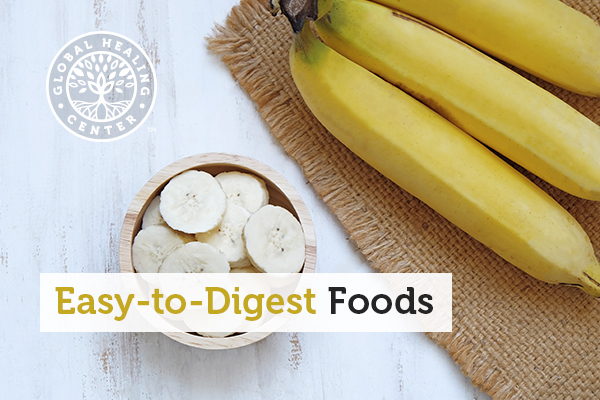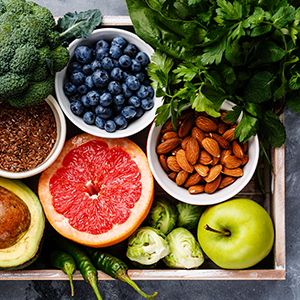
When you're having digestive concerns, you may not feel like eating anything. Even your favorite food may seem unappetizing when you're dealing with nausea, diarrhea, constipation, or other digestive issues. Fortunately, there are easy-to-digest foods that can help you feel better while making sure you get enough nutrients and stay hydrated.
What Is the Digestive System?
Your digestive system starts with your mouth and includes the entire gastrointestinal tract plus the pancreas.[1] When you chew, the digestive enzyme called salivary amylase begins to break down the food right away. This partly digested food passes down the esophagus to the stomach, eventually making its way through the small and large intestines, and out of the body as stool.
All the protein, fat, and carbohydrates you consume have to be broken down into smaller components during digestion. Proteins become amino acids, carbohydrates become simple sugars, and fats become fatty acids and glycerol. Your digestive organs process these smaller nutrients, allowing them to enter the bloodstream, circulate throughout your body, and give you energy and strength.[1]
Just like that, your digestive system has done its job. But when you eat foods that you have trouble digesting, you may end up with uncomfortable symptoms instead of nourishment.
The Best Easy-to-Digest Foods
If you have a digestive condition, such as irritable bowel syndrome (IBS), irritable bowel disease (IBD), or just have a sensitive stomach, you will want to eat easy-to-digest foods. Easy-to-digest foods are typically soft and low in fiber and fat. Their flavor is more bland than spicy or robust. This makes them more gentle on the digestive system and less likely to cause concerns.[2] Eating easy-to-digest foods may bring relief from gas, diarrhea, stomach discomfort, or bloating — leading to a happy belly.[3]
Nut Milk Yogurt
Most yogurt is easy to digest, low in fiber, and contains probiotic microbes.[3] However, a large percentage of people are sensitive to dairy or they are lactose intolerant, which is a major source of digestive complaints. The solution? Try yogurt made from almond, coconut, or cashew milk. Make sure to select unsweetened, plain yogurt. Fruit-containing yogurts may have extra fiber you do not need if you have digestive concerns. In addition, excess sugar makes digestive concerns worse.[2] You can even try making your own vegan probiotic yogurt!
Bananas
Bananas are often recommended for people with gastroenteritis, vomiting, diarrhea, or upset stomach.[4] Bananas contain potassium, an important electrolyte that can be depleted from your body when you have diarrhea or excessive vomiting. Eat bananas in a green or just-ripened form. Overripe bananas with brown spots have more sugar and can have up to three grams of fiber, which can aggravate digestive concerns.[4]
Applesauce
Applesauce is another soft food that is easy to digest.[4] Look for all-natural applesauce without extra sugar or preservatives. If you make your own applesauce, peel the skin off since it has more fiber. An easy way to make applesauce at home is to peel, core, and chop four large organic apples of any variety. Add to a pan with water and boil for 20 minutes or until they're soft. Finally, take them out and mash them with a fork to make applesauce.
White Potatoes
White potatoes have simple carbohydrates and are an easy-to-digest comfort food when needed. Make sure that you remove all skins, cook them thoroughly in water, and mash them with plain, unsweetened nut milk if desired. And the bonus? Potatoes are an excellent prebiotic food that feeds the beneficial bacteria in your gut.
Vegetable Broth & Creamy Soups
The liquid nature of soup can help reduce dehydration from diarrhea or excessive vomiting, while the sodium can replenish lost electrolytes. The U.S. National Library of Medicine recommends soup, particularly broth, for symptoms of ulcers, heartburn, gastrointestinal reflux disease (GERD), nausea, and vomiting.[2] If you make your own organic vegetable broth at home, you're set. The U.S. National Library of Medicine also recommends creamy-textured soups, such as those made with pumpkin or carrots. Avoid soups with milk products, which can cause digestive issues.
Low-Fiber Fruits
In addition to bananas and applesauce, there are several low-fiber fruits that are a good choice when you need an easy-to-digest food. The U.S. National Library of Medicine recommends only these raw fruits in a "very ripe" state: watermelon, cantaloupe, honeydew melon, papayas, nectarines, peaches, and plums.
Low-Fiber Vegetables
If you are seeking vegetables that are easy to digest, the only vegetables you should eat raw include avocado, cucumber (without seeds or skin), zucchini, and lettuce (in small quantities, at first). For cooked vegetables, you can eat spinach, carrots, beets, yellow squash (without seeds), pumpkin, green beans, asparagus, and eggplant.
Fermented Foods
Fermented foods such as pickles, sauerkraut, kimchi, or kombucha can help digestion because they contain gut-boosting probiotics.[5] Sometimes an imbalance of bad to good bacteria causes digestive ailments. Try eating probiotic foods to help restore the balance. However, fermented foods aren't part of most bland diets.[2] For example, people with IBS may want to avoid fermented foods because they can worsen the symptoms of the condition.[6] If you just want to balance your stomach bacteria to determine if it will help your digestion, try some fermented foods and see how your belly responds.
Foods to Avoid
When you're having nausea, gas, bloating, or other digestive concerns, avoid foods with a lot of fiber, fat, or sugar, as they're harder to digest.[2]
- Dairy products: Since so many people are sensitive to the milk sugar lactose or they're lactose intolerant, I recommend avoiding dairy products altogether.
- Deli meats, hot dogs, and sausage: These are highly processed meats full of chemical additives and preservatives that are not good if your stomach is sensitive (or ever).
- Whole wheat or whole grain products: Whole wheat contains gluten, which many people are sensitive to. Whole grain products usually have too much fiber for people who need easy-to-digest foods, and many of them also contain gluten.
- Corn: Besides the fact that most corn is GMO (genetically modified) and should generally be avoided, corn is high in sugar and fiber.
- Dried fruit: The act of drying fruit concentrates the sugar. Dried fruit is also high in fiber.
- Spicy or acidic foods: Spicy and acidic foods can irritate your digestive system, causing heartburn and other uncomfortable digestive symptoms.
- Seeds and nuts: Seeds and nuts are high in fiber and can irritate sensitive GI tracts.
- Fried foods and foods with high oil content: In general, fried foods are extremely unhealthy and you should avoid them.
- Legumes: Although legumes are usually a good choice, they're not ideal if you require food that's easy to digest. Legumes include peas, beans, and lentils and they generally have higher fiber content and cause flatulence. The only exception to this is that you can eat cooked green beans.
- Chocolate: Besides the fact that most chocolate comes with sugar, chocolate has caffeine and fiber that can irritate a sensitive digestive system.
- Other foods to avoid: You should also avoid alcohol, spices, and caffeine since these tend to upset a sensitive stomach.
Do You Need to Eat Easy-to-Digest Foods?
There are many situations that call for eating easy-to-digest foods, such as easing digestive concerns or dealing with a short-term bout of diarrhea, the flu, or a more serious condition like irritable bowel syndrome. Make sure you talk to your healthcare provider before drastically changing your diet and avoiding specific foods beyond a short period as it's easy to miss out on important nutrients.
If You Have IBS or IBD
People with irritable bowel syndrome or irritable bowel disease may need to eat easy-to-digest foods. Some of the symptoms of both conditions include gas, constipation, diarrhea, stomach pain, and bloating. People with IBS and IBD may need to avoid gluten, reduce their fiber intake, and limit certain foods.[7]
If You Have Diarrhea
If you have an occasional bout of diarrhea — whether from food poisoning or a virus — you may want to eat easy-to-digest foods for a short period of time. Some of the common symptoms that accompany loose stools include cramps and stomach pain. In addition to eating easily digestible foods, you should avoid alcohol, fatty foods, spices, dairy, and caffeine. If you completely lose your appetite, stay hydrated by drinking more water.[8]
If You Have Heartburn
People with heartburn may also need to eat easy-to-digest foods. Two common causes of heartburn include gastroesophageal reflux disease (GERD) and gastroesophageal reflux (GER). These conditions happen when stomach acids come back up and irritate the esophagus. In addition to a stinging sensation in your throat or chest, you may also have nausea, vomiting, and discomfort. Try eating easy-to-digest foods, and avoid fatty foods, coffee, alcohol, spicy foods, tomatoes, and chocolate.[9] Eating smaller meals might also help.
Points to Remember
If you're having digestive concerns, focus on eating easy-to-digest foods. Try to eat more nut milk yogurt, bananas, applesauce, creamy soup, vegetable broth, fermented foods, and certain fruits and cooked vegetables. Avoid eating foods that are high in sugar, fat, or fiber because they can make you feel worse. For instance, don't eat fried foods, dried fruit, dairy, or whole grain products.
If you want to improve your overall digestive health, then consider taking probiotics or digestive enzymes. These supplements promote normal digestion and may be able to help you enjoy more foods.
References (9)
- Your Digestive System & How it Works. National Institute of Diabetes and Digestive and Kidney Diseases, National Institutes of Health. Updated Dec. 2017. Accessed 4 Oct. 2018.
- Wax E. Bland Diet. US National Library of Medicine: MedLinePlus. Updated 13 Jan. 2018. Accessed 4 Oct. 2018.
- Wax E. Low-Fiber Diet. US National Library of Medicine: MedLinePlus. Updated 14 Aug. 2016. Accessed 4 Oct. 2018.
- Bae SH. Diets for constipation. Pediatr Gastroenterol Hepatol Nutr. 2014;17(4):203-208.
- Fermented Foods Can Add Depth to Your Diet. Harvard University Medical School. Updated Jul. 2018. Accessed 4 Oct. 2018.
- Vahedi H, et al. Irritable Bowel Syndrome: a review article. Middle East J Dig Dis. 2010;2(2):66-77.
- Eating, Diet, & Nutrition for Irritable Bowel Syndrome. National Institute of Diabetes and Digestive and Kidney Diseases, National Institutes of Health. Updated Nov. 2017. Accessed 4 Oct. 2018.
- Eating, Diet, & Nutrition for Diarrhea. National Institute of Diabetes and Digestive and Kidney Diseases, National Institutes of Health. Updated Nov. 2016. Accessed 4 Oct. 2018.
- Eating, Diet, & Nutrition for GER & GERD. National Institute of Diabetes and Digestive and Kidney Diseases, National Institutes of Health. Updated Nov. 2014. Accessed 4 Oct. 2018.
†Results may vary. Information and statements made are for education purposes and are not intended to replace the advice of your doctor. If you have a severe medical condition or health concern, see your physician.








